单词文化类
100个中国传统文化英文单词
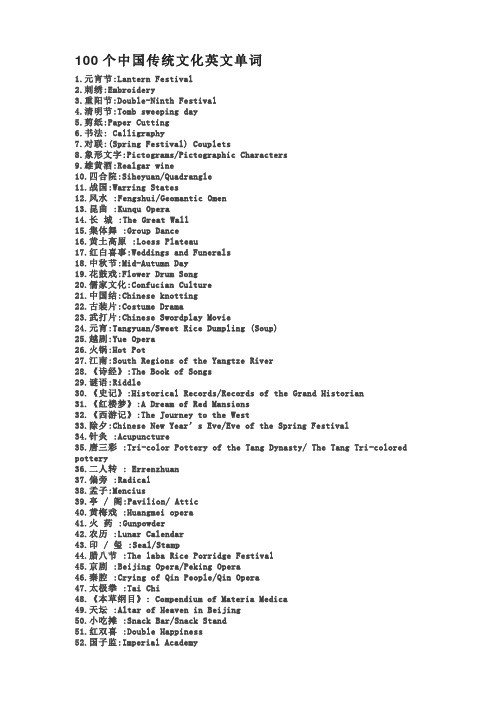
100个中国传统文化英文单词1.元宵节:Lantern Festival2.刺绣:Embroidery3.重阳节:Double-Ninth Festival4.清明节:Tomb sweeping day5.剪纸:Paper Cutting6.书法: Calligraphy7.对联:(Spring Festival) Couplets8.象形文字:Pictograms/Pictographic Characters9.雄黄酒:Realgar wine10.四合院:Siheyuan/Quadrangle11.战国:Warring States12.风水 :Fengshui/Geomantic Omen13.昆曲 :Kunqu Opera14.长城 :The Great Wall15.集体舞 :Group Dance16.黄土高原 :Loess Plateau17.红白喜事:Weddings and Funerals18.中秋节:Mid-Autumn Day19.花鼓戏:Flower Drum Song20.儒家文化:Confucian Culture21.中国结:Chinese knotting22.古装片:Costume Drama23.武打片:Chinese Swordplay Movie24.元宵:Tangyuan/Sweet Rice Dumpling (Soup)25.越剧:Yue Opera26.火锅:Hot Pot27.江南:South Regions of the Yangtze River28.《诗经》:The Book of Songs29.谜语:Riddle30.《史记》:Historical Records/Records of the Grand Historian31.《红楼梦》:A Dream of Red Mansions32.《西游记》:The Journey to the West33.除夕:Chinese New Year’s Eve/Eve of the Spring Festival34.针灸 :Acupuncture35.唐三彩 :Tri-color Pottery of the Tang Dynasty/ The Tang Tri-colored pottery36.二人转 : Errenzhuan37.偏旁 :Radical38.孟子:Mencius39.亭 / 阁:Pavilion/ Attic40.黄梅戏 :Huangmei opera41.火药 :Gunpowder42.农历 :Lunar Calendar43.印 / 玺 :Seal/Stamp44.腊八节 :The laba Rice Porridge Festival45.京剧 :Beijing Opera/Peking Opera46.秦腔 :Crying of Qin People/Qin Opera47.太极拳 :Tai Chi48.《本草纲目》: Compendium of Materia Medica49.天坛 :Altar of Heaven in Beijing50.小吃摊 :Snack Bar/Snack Stand51.红双喜 :Double Happiness52.国子监:Imperial Academy53.春卷 :Spring Roll(s)54.莲藕 :Lotus Root55.罗盘 :Luopan56.故宫博物院 :The Palace Museum57.相声:Cross-talk/Comic Dialogue58.五行 :Five Phases59.北京烤鸭 : Beijing Roast Duck60.《桃花扇》:The Peach Blossom Fan61.木偶戏:Puppet Show62.敦煌莫高窟:Mogao Caves63.电视小品:TV Sketch/TV Skit64.甲骨文:Oracle Bone Inscriptions65.古筝:Chinese Zither66.二胡 :Urheen67.门当户对:Perfect Match/Exact Match68.《水浒》: Water Margin/Outlaws of the Marsh69.端午节:Dragon Boat Festival70.文房四宝:“The Four Treasure of the Study” “Brush, Inkstick, Paper and Inkstone”71.兵马俑: Cotta Warriors/ Terracotta Army72.旗袍:Cheongsam73.指南针:Compass74.泼水节:Water-Splashing Day75.馄饨:Wonton76. 花卷:Steamed twisted rolls77.羊肉泡馍:Pita Bread Soaked in Lamb Soup78.冰糖葫芦:A stick of sugar-coated haws (or apples, etc.)79.八宝饭:Eight-treasure rice pudding80.粉丝:Glass Noodles81.豆腐脑:Jellied bean curd82.小品:Witty Skits83.孝顺:To show filial obedience84.武术:Wushu (Chinese Martial Arts)85.宣纸:Rice Paper86.衙门: Yamen87.叩头:Kowtow88.中庸:The way of medium(cf. Golden Means)89.牌楼:Pailou (pai-loo)90.东坡肉:Dongpo Pork91.中山陵:The Sun Yat-sen Mausoleum92.秦淮河:Qinhuai River93.玄武湖:Xuanwu Lake94.夫子庙:The Confucian Temple95.鸭血粉丝:Duck blood and Vermicelli Soup96.盐水鸭:Yanshuiya, or salted and baked duck97.大煮干丝:Gansi98.小笼包:Steamed buns99.明孝陵:Ming Tomb100.云锦:Nanjing brocade。
人类与社会英语词汇大全
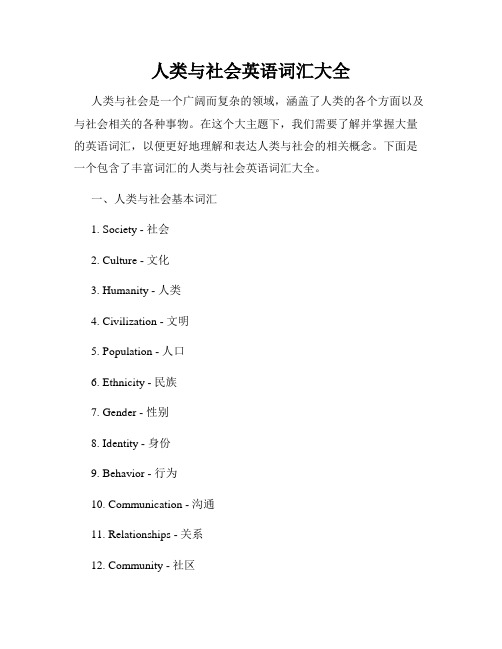
人类与社会英语词汇大全人类与社会是一个广阔而复杂的领域,涵盖了人类的各个方面以及与社会相关的各种事物。
在这个大主题下,我们需要了解并掌握大量的英语词汇,以便更好地理解和表达人类与社会的相关概念。
下面是一个包含了丰富词汇的人类与社会英语词汇大全。
一、人类与社会基本词汇1. Society - 社会2. Culture - 文化3. Humanity - 人类4. Civilization - 文明5. Population - 人口6. Ethnicity - 民族7. Gender - 性别8. Identity - 身份9. Behavior - 行为10. Communication - 沟通11. Relationships - 关系12. Community - 社区二、政治与体制1. Government - 政府2. Democracy - 民主3. Monarchy - 君主制4. Republic - 共和制5. Constitution - 宪法6. Parliament - 国会7. President - 总统8. Prime Minister - 首相9. Elections - 选举10. Policy - 政策11. Law - 法律12. Justice - 正义三、教育与就业1. Education - 教育2. School - 学校3. University - 大学4. Curriculum - 课程5. Teacher - 教师6. Student - 学生7. Knowledge - 知识8. Skills - 技能9. Career - 职业10. Employment - 就业11. Job - 工作12. Resume - 简历四、经济与贸易1. Economy - 经济2. Trade - 贸易3. Business - 商业4. Market - 市场5. Finance - 金融6. Investment - 投资7. Stock - 股票8. Market - 市场9. Consumer - 消费者10. Entrepreneur - 企业家11. Innovation - 创新12. Globalization - 全球化五、社会问题与挑战1. Poverty - 贫困2. Inequality - 不平等3. Discrimination - 歧视4. Crime - 犯罪5. Corruption - 腐败6. Violence - 暴力7. Terrorism - 恐怖主义8. Pollution - 污染9. Climate Change - 气候变化10. Health - 健康11. Education - 教育12. Human Rights - 人权六、媒体与传媒1. Media - 媒体2. News - 新闻3. Journalism - 新闻业4. Television - 电视5. Internet - 互联网6. Social Media - 社交媒体7. Advertising - 广告8. Public Relations - 公关9. Mass Communication - 大众传播10. Entertainment - 娱乐11. Film - 电影12. Music - 音乐七、文化与艺术1. Art - 艺术2. Literature - 文学3. Music - 音乐4. Dance - 舞蹈5. Theater - 剧院6. Film - 电影7. Architecture - 建筑8. Sculpture - 雕塑9. Museum - 博物馆10. Tradition - 传统11. Cultural Diversity - 文化多样性12. Heritage - 遗产八、家庭与人际关系1. Family - 家庭2. Marriage - 婚姻3. Parent - 父母4. Child - 孩子5. Sibling - 兄弟姐妹6. Love - 爱7. Friendship - 友谊8. Divorce - 离婚9. Generation - 一代10. Respect - 尊重11. Support - 支持12. Conflict - 冲突这个人类与社会英语词汇大全包含了各个方面的词汇,希望能够帮助您更好地理解和表达人类与社会的相关概念。
think starter单词表
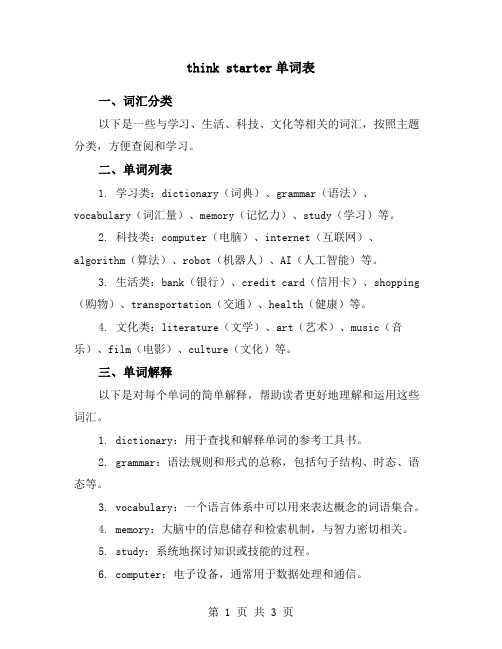
think starter单词表一、词汇分类以下是一些与学习、生活、科技、文化等相关的词汇,按照主题分类,方便查阅和学习。
二、单词列表1. 学习类:dictionary(词典)、grammar(语法)、vocabulary(词汇量)、memory(记忆力)、study(学习)等。
2. 科技类:computer(电脑)、internet(互联网)、algorithm(算法)、robot(机器人)、AI(人工智能)等。
3. 生活类:bank(银行)、credit card(信用卡)、shopping (购物)、transportation(交通)、health(健康)等。
4. 文化类:literature(文学)、art(艺术)、music(音乐)、film(电影)、culture(文化)等。
三、单词解释以下是对每个单词的简单解释,帮助读者更好地理解和运用这些词汇。
1. dictionary:用于查找和解释单词的参考工具书。
2. grammar:语法规则和形式的总称,包括句子结构、时态、语态等。
3. vocabulary:一个语言体系中可以用来表达概念的词语集合。
4. memory:大脑中的信息储存和检索机制,与智力密切相关。
5. study:系统地探讨知识或技能的过程。
6. computer:电子设备,通常用于数据处理和通信。
7. internet:全球性的计算机网络,通过互联网连接世界各地的计算机和设备。
8. algorithm:计算程序或算法的步骤和逻辑,用于解决特定问题或执行特定任务。
9. robot:自动执行任务和工作的机器,通常由计算机控制。
10. AI:人工智能的简称,一种模拟人类智能的技术和理论,旨在使计算机能够像人类一样思考和学习。
11. bank:金融机构,提供存款、贷款、投资等服务。
12. credit card:信用卡,一种用于消费和支付的金融工具。
13. shopping:购买物品或商品的行为。
高中常见单词背后的文化背景故事
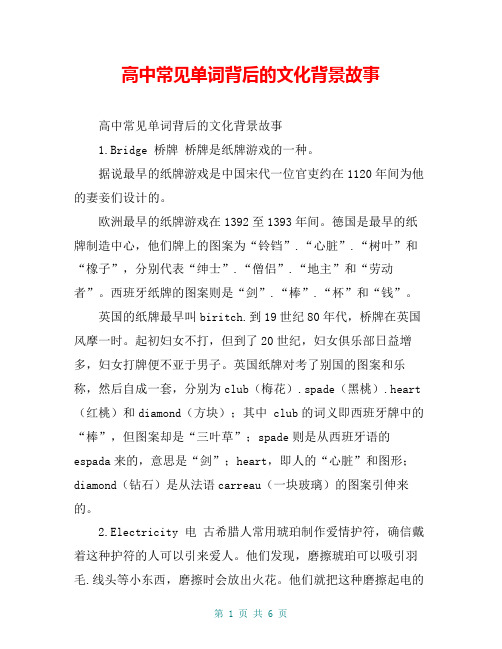
高中常见单词背后的文化背景故事高中常见单词背后的文化背景故事1.Bridge 桥牌桥牌是纸牌游戏的一种。
据说最早的纸牌游戏是中国宋代一位官吏约在1120年间为他的妻妾们设计的。
欧洲最早的纸牌游戏在1392至1393年间。
德国是最早的纸牌制造中心,他们牌上的图案为“铃铛”.“心脏”.“树叶”和“橡子”,分别代表“绅士”.“僧侣”.“地主”和“劳动者”。
西班牙纸牌的图案则是“剑”.“棒”.“杯”和“钱”。
英国的纸牌最早叫biritch.到19世纪80年代,桥牌在英国风摩一时。
起初妇女不打,但到了20世纪,妇女俱乐部日益增多,妇女打牌便不亚于男子。
英国纸牌对考了别国的图案和乐称,然后自成一套,分别为club(梅花).spade(黑桃).heart (红桃)和diamond(方块);其中 club的词义即西班牙牌中的“棒”,但图案却是“三叶草”;spade则是从西班牙语的espada来的,意思是“剑”;heart,即人的“心脏”和图形;diamond(钻石)是从法语carreau(一块玻璃)的图案引伸来的。
2.Electricity 电古希腊人常用琥珀制作爱情护符,确信戴着这种护符的人可以引来爱人。
他们发现,磨擦琥珀可以吸引羽毛.线头等小东西,磨擦时会放出火花。
他们就把这种磨擦起电的现象叫做elektron.来自希腊语elektor,意即“发光的太阳”,进入拉丁语后写作electrum.英语演变为 electricity。
3.School 学校 School这个词是从希腊语schole一词来的,意思是“闲暇”。
在古希腊人看来,即些从事战争和搞政治的人是辛苦的,而只有“闲暇”的人才有时间读书学习。
后来,古希腊的哲学家亚里士多德.柏拉图给青年讲课的地方就被称作schole,这个词以后转成拉丁语词school,后又被英语借用。
和school密切相关的还有一个词:scholar(学者)。
同样道理,这个词是指那些有“闲暇”时间读书.研究,构思以及进行学术讨论的人。
文化类英文单词
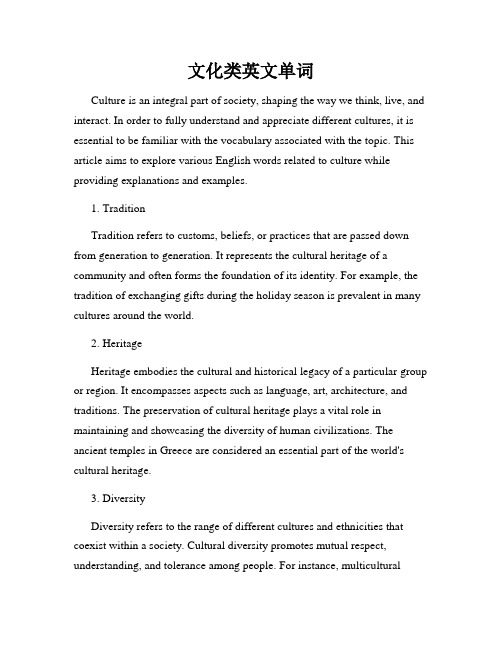
文化类英文单词Culture is an integral part of society, shaping the way we think, live, and interact. In order to fully understand and appreciate different cultures, it is essential to be familiar with the vocabulary associated with the topic. This article aims to explore various English words related to culture while providing explanations and examples.1. TraditionTradition refers to customs, beliefs, or practices that are passed down from generation to generation. It represents the cultural heritage of a community and often forms the foundation of its identity. For example, the tradition of exchanging gifts during the holiday season is prevalent in many cultures around the world.2. HeritageHeritage embodies the cultural and historical legacy of a particular group or region. It encompasses aspects such as language, art, architecture, and traditions. The preservation of cultural heritage plays a vital role in maintaining and showcasing the diversity of human civilizations. The ancient temples in Greece are considered an essential part of the world's cultural heritage.3. DiversityDiversity refers to the range of different cultures and ethnicities that coexist within a society. Cultural diversity promotes mutual respect, understanding, and tolerance among people. For instance, multiculturalfestivals celebrate the diversity of various communities, allowing individuals from different backgrounds to appreciate and learn about each other's cultures.4. ArtArt represents creative expression and is deeply intertwined with culture. It encompasses various forms, including painting, sculpture, music, dance, and theater. Art can reflect cultural values, beliefs, and historical events. The Mona Lisa, painted by Leonardo da Vinci, is an iconic piece of art that symbolizes the Renaissance period in European culture.5. LanguageLanguage is a fundamental element of culture, serving as a means of communication and expression. It not only enables the transmission of cultural knowledge but also shapes the way individuals perceive the world. For example, the Chinese language, with its unique characters and tonal system, is an essential part of Chinese cultural identity.6. CuisineCuisine refers to the traditional foods and cooking practices associated with a particular culture or region. It reflects the geography, history, and agricultural practices of a community. Italian cuisine, famous for its pasta and pizza, is beloved worldwide and showcases the rich culinary traditions of Italy.7. FestivalsFestivals are cultural celebrations that mark significant events or religious occasions. They often involve rituals, music, dance, food, and other traditional activities. Festivals provide an opportunity for communities to come together and strengthen cultural bonds. The Carnival in Brazil is a vibrant and lively festival known for its colorful parades and samba dancing.8. CustomsCustoms are socially accepted behaviors and practices within a specific culture. They can include greetings, gestures, taboos, and social norms. Understanding customs is crucial when visiting or interacting with individuals from different cultures. For instance, in many Asian cultures, it is customary to remove shoes before entering someone's home.9. BeliefsBeliefs encompass religious, spiritual, or philosophical views held by individuals or communities. They shape people's values, morals, and behaviors. Religious beliefs, such as Islam or Buddhism, have a significant influence on the daily lives and cultural practices of their followers.10. GlobalizationGlobalization refers to the increasing interconnectedness and interdependence of people, economies, and cultures worldwide. It has led to the diffusion and blending of cultural elements across borders. The spread of fast food chains like McDonald's to different countries is an example of how globalization impacts local cultures.In conclusion, the above words provide a glimpse into the vast and diverse vocabulary associated with culture. Understanding and using thesewords can enhance our appreciation for cultural differences and facilitate effective communication in multicultural settings. Embracing cultural diversity promotes harmony and enriches our collective human experience.。
有关中国传统文化的英语单词
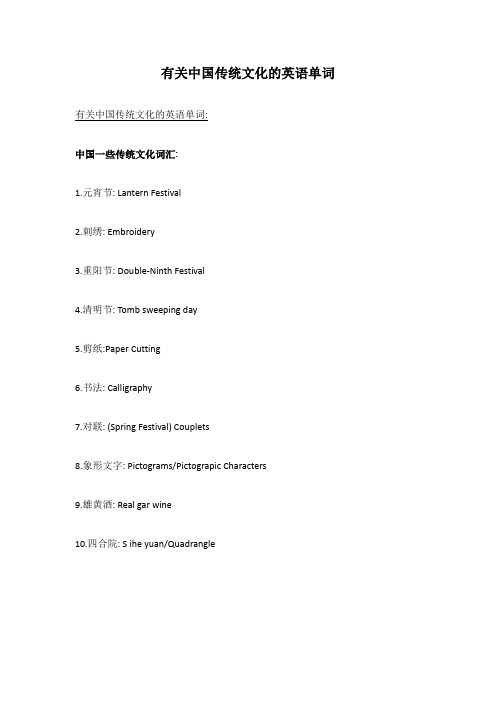
有关中国传统文化的英语单词有关中国传统文化的英语单词:中国一些传统文化词汇:1.元宵节: Lantern Festival2.刺绣: Embroidery3.重阳节: Double-Ninth Festival4.清明节: Tomb sweeping day5.剪纸:Paper Cutting6.书法: Calligraphy7.对联: (Spring Festival) Couplets8.象形文字: Pictograms/Pictograpic Characters9.雄黄酒: Real gar wine10.四合院: S ihe yuan/Quadrangle11.战国: Warring States12.风-水: Feng shui/Geo mantic Omen13.昆曲: Kun qu Opera14.长城:The Great Wall15.集体舞: Group Dance16.黄土高原: Loess Plateau17.红白喜事: Weddings and Funerals18.中秋节: Mid-Autumn Day19.花鼓戏: Flower Drum Song20.儒家文化: Confucian Culture21.中国结:Chinese knotting22.古装片: Costume Drama23.武打片: Chinese Swordplay Movie24.元宵: Tang yuan/Sweet Rice Dumpling (Soup)25.越剧:Yue Opera26.火锅: Hot Pot27.江南: South Regions of the Yangtze River28. 《诗经》: The Book of Songs29.谜语: Riddle30.《史记》: Historical Records/Records of the Grand Historian31.《红楼梦》: A Dream of Red Mansions32.《西游记》: The Journey to the West33.除夕: Chinese New Year' s Eve/Eve of the Spring Festival34.针灸: Acupuncture35.唐三彩: Tri-color Pottery of the Tang Dynasty/ The Tang Tri-colored pottery36.二人转: Errenzhuan37.偏旁: Radical38.孟子: Mencius39.亭/阁: Pavilion/ Attic40.黄梅戏: Huangmei opera41.火药: Gunpowder42.农历: Lunar Calendar43.印/玺: Seal/Stamp44.腊八节: The laba Rice Porridge Festival45.京剧: Beijing Opera/Peking Opera46.秦腔: Crying of Qin People/Qin Opera47.太极拳:Tai Chi48.《本草纲目》: Compendium of Materia Medica49.天坛: Altar of Heaven in Beijing50.小吃摊:Snack Bar/Snack Stand51.红双喜: Double Happiness52.国子监: Imperial Academy53.春卷: Spring Roll(s)54.莲藕: Lotus Root55.罗盘: Luopan56.故宫博物院: The Palace Museum57.相声: Cross-talk/Comic Dialogue58.五行: Five Phases59.北京烤鸭: Beijing Roast Duck60.《桃花扇》: The Peach Blossom Fan61.木偶戏:Puppet Show62.敦煌莫高窟:Mogao Caves63.电视小品: TV Sketch/TV Skit64.甲骨文:Oracle Bone Inions65.古筝:Chinese Zither66.二胡:Urheen67.门当户对: Perfect Match/Exact Match68.《水浒》: Water Margin/Outlaws of the Marsh69.除夕:Chinese New Years Eve70.文房四宝( 笔墨纸砚):"The Four Treasure of the Study""Brush,Inkstick,Paper, and Inkstone”71.兵马俑: Cotta Warriors/ Terracotta Army72.旗袍:Cheongsam73.指南针:Compass74.泼水节: Water-Splashing Day75.馄饨: Wonton76.花卷: Steamed twisted rolls77.羊肉泡馍: Pita Bread Soaked in Lamb Soup78.冰糖葫芦: A stick of sugar-coated haws (or apples,etc.)79.八宝饭: Eight-treasure rice pudding80.粉丝: Glass Noodles81.豆腐脑: Jellied bean curd82.小品: Witty Skits83.孝顺: To show filial obedience84.武术: Wushu(Chinese Martial Arts)85.宣纸:Rice Paper86.衙门: Yamen87.叩头:Kowtow88.中庸: The way of medium(cf.Golden Means)89.牌楼: Pailou( pai-loo )90.东坡肉: Dongpo Pork91.中山陵: The Sun Yat-sen Mausoleum92.秦淮河: Qinhuai River93.玄武湖: Xuanwu Lake94.夫子庙: The Confucian Temple95.鸭血粉丝:Duck blood fans96.盐水鸭: Yanshuiya,or salted and baked duck97.大煮干丝:Gansi98.小笼包: Steamed buns99.明孝陵:Ming Tomb100.云锦: Nanjing brocade。
英文单词与文化

英文单词与文化
摘要:
1.英文单词与文化的关系
2.英文单词的来源和演变
3.文化对英文单词的影响
4.英文单词对文化传播的贡献
5.学习英文单词的重要性
正文:
英文单词与文化之间有着紧密的联系。
语言是文化的一部分,而单词则是构成语言的基本单位。
英文单词的来源和演变,以及它们在各种语境下的使用,都反映了英语国家的历史、传统和价值观。
英文单词的来源可以追溯到古英语、拉丁语和希腊语等。
这些语言背后的文化,深深地影响了英文单词的形成和意义。
例如,“democracy”(民主)这个词,就来自于古希腊语,反映了古希腊的政治制度和价值观。
同样,“salad”(沙拉)这个词,则来自于拉丁语的“salata”,意为“盐”,反映了罗马时期的饮食习惯。
文化对英文单词的影响也是深远的。
英语世界中的许多节日,如圣诞节、感恩节等,都有对应的英文单词,这些单词反映了这些节日的庆祝方式和背后的文化意义。
例如,“Christmas”(圣诞节)这个词,就来自于古英语的“Christes maesse”,意为“基督的弥撒”,反映了这个节日的宗教意义。
英文单词也对文化传播起到了重要的贡献。
随着英语的全球化,许多英文单词已经成为国际通用词汇,使得不同文化之间的交流变得更加便捷。
例如,
“globalization”(全球化)这个词,虽然源自英语,但其意义已经被世界各地的人们所理解和接受。
因此,学习英文单词不仅仅是学习一门语言,更是理解和接触其他文化的途径。
所有学科历史单词

所有学科历史单词1. 历史(lì shǐ) - history2. 学科(xué kē) - subject3. 文化 (wén huà) - culture4. 社会 (shè huì) - society5. 政治 (zhèng zhì) - politics6. 宗教(zōng jiào) - religion7. 经济(jīng jì) - economy8. 科技(kē jì) - science and technology9. 文明 (wén míng) - civilization10. 战争(zhàn zhēng) - war11. 农业 (nóng yè) - agriculture12. 工业(gōng yè) - industry13. 帝国 (dì guó) - empire14. 古代(gǔ dài) - ancient15. 现代 (xiàn dài) - modern16. 中世纪(zhōng shì jì) - Middle Ages17. 文艺复兴(wén yì fù xīng) - Renaissance18. 启蒙运动(qǐ méng yùn dòng) - Enlightenment19. 革命 (gé mìng) - revolution20. 自由 (zì yóu) - freedom21. 思想家(sī xiǎng jiā) - thinker22. 统治者(tǒng zhì zhě) - ruler23. 民主(mín zhǔ) - democracy24. (dú cái) - dictatorship25. 君主(jūn zhǔ) - monarch26. 民族 (mín zú) - ethnic group27. 市民 (shì mín) - citizen28. 战胜 (zhàn shèng) - conquer29. 钢铁(gāng tiě) - steel30. 进步 (jìn bù) - progress31. 原始人(yuán shǐ rén) - primitive man32. 社会科学(shè huì kē xué) - social sciences33. 历史学家(lì shǐ xué jiā) - historian34. 史书(shǐ shū) - historical book35. 文化遗产(wén huà yí chǎn) - cultural heritage36. 历史事件(lì shǐ shì jiàn) - historical event37. 历史发展(lì shǐ fā zhǎn) - historical development38. 重要人物 (zhòng yào rén wù) - important figure39. 古迹(gǔ jì) - historical site40. 遗址(yí zhǐ) - ruins41. 解放(jiě fàng) - liberation42. 冷战(lěng zhàn) - Cold War43. 帝国主义(dì guó zhǔ yì) - imperialism44. 文化革命 (wén huà gé mìng) - Cultural Revolution45. 正义 (zhèng yì) - justice46. 平等(píng děng) - equality47. 科学家(kē xué jiā) - scientist48. 历史资料(lì shǐ zī liào) - historical data49. 纪录片 (jì lù piàn) - documentary50. 研究(yán jiū) - research51. 民俗 (mín sú) - folklore52. 个人自由 (gè rén zì yóu) - individual freedom53. 战略 (zhàn lüè) - strategy54. 群众运动 (qún zhòng yùn dòng) - mass movement55. 政府(zhèng fǔ) - government56. 国家(guó jiā) - nation57. 政策 (zhèng cè) - policy58. 科学发现(kē xué fā xiàn) - scientific discovery59. 历史遗迹(lì shǐ yí jì) - historical relic60. 遗传 (yí chuán) - inheritance61. 标志(biāo zhì) - symbol62. 唄友(bài yǒu) - tradition63. 历代 (lì dài) - successive generations64. 宣言(xuān yán) - declaration65. 理论(lǐ lùn) - theory66. 知识(zhī shi) - knowledge67. 政治家(zhèng zhì jiā) - politician68. 发展(fā zhǎn) - development69. 史实(shǐ shí) - historical fact70. 公平(gōng píng) - fairness71. 民主国家(mín zhǔ guó jiā) - democratic country72. 阶级(jiē jí) - class73. 符号 (fú hào) - symbol74. 传统(chuán tǒng) - tradition75. 军事(jūn shì) - military affairs76. 政权 (zhèng quán) - political power77. 贸易 (mào yì) - trade78. 驱逐(qū zhú) - expulsion79. 大陆 (dà lù) - mainland80. 春秋战国时期(chūn qiū zhàn guó shí qī) - Spring and Autumn Period and the Warring States Period81. 支配(zhī pèi) - domination82. 教育 (jiào yù) - education83. 契约(qì yuē) - contract84. 冷战时期(lěng zhàn shí qī) - Cold War era85. 邪教 (xié jiào) - cult86. 政教合一(zhèng jiào hé yī) - the integration of politics and religion87. 世界史(shì jiè shǐ) - world history88. 政权交替(zhèng quán jiāo tì) - transfer of power89. 惩罚 (chéng fá) - punishment90. 领土(lǐng tǔ) - territory91. 文化交流(wén huà jiāo liú) - cultural exchange92. 人类学 (rén lèi xué) - anthropology93. 文字 (wén zì) - writing94. 化石 (huà shí) - fossil95. 个体(gè tǐ) - individual96. 影响(yǐng xiǎng) - influence97. 世纪 (shì jì) - century98. 勇敢(yǒng gǎn) - bravery99. 重要 (zhòng yào) - importance100. 穷困 (qióng kùn) - povertyI hope this document helps you with your study of historical vocabulary across various subjects. If you have any further questions, feel free to ask.。
- 1、下载文档前请自行甄别文档内容的完整性,平台不提供额外的编辑、内容补充、找答案等附加服务。
- 2、"仅部分预览"的文档,不可在线预览部分如存在完整性等问题,可反馈申请退款(可完整预览的文档不适用该条件!)。
- 3、如文档侵犯您的权益,请联系客服反馈,我们会尽快为您处理(人工客服工作时间:9:00-18:30)。
文化类
culture[cul·ture || 'kʌltʃə]
n.文化, 耕种, 修养
v.耕种, 使有教养heritage['her·it·age || 'herɪtɪdʒ] n.遗产; 传统; 继承权
interaction[,in·ter'ac·tion || ‚ɪntə(r)ər'ækʃn] n.交互作用; 交感; 交流(计算机用语)invasion[in·va·sion || ɪn'veɪʒn] n.侵犯, 侵害, 侵入
conflict[con·flict || 'kɒnflɪkt]
n.冲突, 争执, 矛盾
v.矛盾, 冲突; 倾轧; 斗争, 战斗moral[mor·al || 'mɔrəl /'mɒ-]
n.道德, 寓意, 品行
adj.道德的, 良心的, 品性端正的
morality[mo·ral·i·ty || mə'ræləɪtɪ] n.道德, 品行, 教训humanity[hu·man·i·ty || hjuː'mænətɪ] n.人性; 博爱; 人类
abroad[a·broad || ə'brɔːd]
adv.在国外; 在外面; 到国外; 到外面exchange[ex·change || ɪks'tʃeɪndʒ]
n.交换, 交易所, 汇兑
v.交换; 兑换; 调换; 交换; 兑换
spread[spred]
n.传播, 伸展, 散布
v.使伸展; 展开; 张开; 延伸; 传开; 蔓延harm[hɑrm /hɑːm]
n.伤害, 害处
v.伤害; 损害
dominate['domi·nate || 'dɑmɪneɪt /'dɒm]
v.支配, 控制, 统治; 高耸于, 俯视; 在...中占主要地位; 处于支配地位dominant['dom·i·nant || 'dɑmɪnənt /'dɒm]
n.显性状; 显性; 优势
adj.占优势的, 支配的
ethnic[eth·nic || 'eθnɪk] adj.种族的feast[fɪːst]
n.宴会, 节会, 酒席
v.款待, 请客, 享乐; 参加宴会; 享受
festival[fes·ti·val || 'festəvl]
n.节日, 欢宴, 庆祝及祭祀adj.节日的, 快乐的, 喜庆的annual[an·nu·al || 'ænjʊəl]
n.年鉴, 年刊; 一年生植物
adj.每年的; 一年一次的; 一年生的
manner[man·ner || 'mænə(r)]native[na·tive || 'neɪtɪv]
n.样子, 风格, 礼貌n.本地人, 土人, 土产
adj.本国的, 自然的, 与生俱来的
ancestor[an·ces·tor || 'ænsestə] n.祖宗, 祖先; 先驱; 原型; 被继承人tradition[tra·di·tion || trə'dɪʃn] n.传统, 惯例
traditional[tra'di·tion·al || trə'dɪʃnəl] adj.传统的; 惯例的; 口传的, 传说的socialism['so·cial·ism || 'səʊʃəlɪzm] n.社会主义, 社会主义运动
capitalism[cap·i·tal·ism || 'kæpɪtəlɪzəm] n.资本主义translate[trans·late || træns'leɪt]
v.翻译, 转化, 解释; 翻译; 解释, 表达
worldwide
adj.全世界的
Mid-autumn Festival 中秋节National Day 国庆节Chinese New Year 春节Tomb-sweeping Day 清明节Peking Opera 京剧Cantonese Opera 粤剧
文化入侵
cultural invasion
文化冲突
culture conflict cultural conflict
文化融合
culture hybrid。
